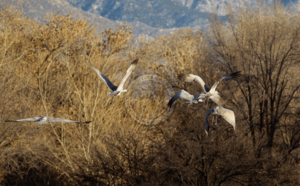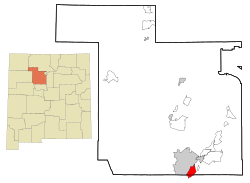Corrales, New Mexico facts for kids
Quick facts for kids
Corrales, New Mexico
|
|
|---|---|
|
Village
|
|

Village of Corrales
|
|

Location of Corrales, New Mexico
|
|
| Country | United States |
| State | New Mexico |
| Counties | Sandoval |
| Area | |
| • Total | 10.95 sq mi (28.37 km2) |
| • Land | 10.79 sq mi (27.94 km2) |
| • Water | 0.16 sq mi (0.43 km2) |
| Elevation | 5,036 ft (1,535 m) |
| Population
(2020)
|
|
| • Total | 8,493 |
| • Density | 787.19/sq mi (303.93/km2) |
| Time zone | UTC−7 (Mountain (MST)) |
| • Summer (DST) | UTC−6 (MDT) |
| ZIP code |
87048
|
| Area code(s) | 505 |
| FIPS code | 35-17960 |
| GNIS feature ID | 2413544 |
Corrales is a village in southern Sandoval County, New Mexico, United States. It was first farmed by the Tiquex Pueblo people. They chose this spot because it was close to the Rio Grande river. Spanish farmers from Nuevo México also settled here in the late 1500s.
Even though it's near the big city of Albuquerque and Rio Rancho, Corrales still feels like a quiet, rural village. In 2020, about 8,493 people lived here.
The Rio Grande Bosque, a forest along the river, is on the eastern edge of the village. It provides a safe home for many native animals and plants. Old acequias (water canals) built by Pueblo and Spanish people are still used today. They help bring water to farms.
Contents
History of Corrales Village
The village of Corrales gets its name from the Spanish word for "corrals." It is built where two Tiguex Indian Pueblos once stood. These pueblos were settled before the year 500 AD.
Spanish colonists and explorers came to the area around 1540. They later built an adobe church called the Church of San Ysidro in 1868. It was named after the yearly fiesta de San Ysidro in May.
In 1710, a large area of land, including Corrales, was given to a Spanish soldier named Corporal Francisco Montes Vigil. He sold it in 1712 to Captain Juan Gonzáles Bas. Then, Gonzáles sold the land that became Corrales in 1718 to Salvador Martinez. Over time, this land was divided and sold for farming and raising animals.
The current village government of Corrales was officially started in 1971. In 2007, CNN Money listed Corrales as one of the top 100 best places to live.
Geography and Location
Corrales covers about 11.2 square miles (29 square kilometers). Most of this area is land, with a small part being water.
Until 2005, Corrales was located in two different counties: Bernalillo and Sandoval. But in 2005, a special vote made the entire village part of Sandoval County. This means the whole village is now in one county.
Corrales Climate
Corrales has a climate with warm summers and mild winters. The hottest month is July, with average high temperatures around 91.7°F (33.2°C). The coldest month is January, with average low temperatures around 20.9°F (-6.2°C).
The village gets most of its rain in July and August. Snowfall is light, mainly in December and January.
Population and People
| Historical population | |||
|---|---|---|---|
| Census | Pop. | %± | |
| 1980 | 2,791 | — | |
| 1990 | 5,453 | 95.4% | |
| 2000 | 7,334 | 34.5% | |
| 2010 | 8,329 | 13.6% | |
| 2020 | 8,493 | 2.0% | |
| U.S. Decennial Census | |||
Corrales is part of the larger Albuquerque metropolitan area. This means it's connected to the bigger city of Albuquerque.
In 2000, there were 7,334 people living in Corrales. About 25.55% of the population identified as Hispanic or Latino. The village also has a growing Asian population.
The average age in Corrales in 2000 was 42 years old. About 24.6% of the people were under 18. The median income for a family was about $79,331.
Village Infrastructure
Unlike nearby cities, many homes and businesses in Corrales do not have a central water or sewage system. This means most places have their own water wells and systems for waste disposal.
The village has many canals that bring water from the Rio Grande. These canals are used to water crops and provide water for livestock.
Nature and Wildlife
Corrales is a very green area with many large cottonwood trees and other native plants. However, Russian olive trees, which are not native, also grow here and can take over.
The village has two main types of natural areas. One is a wet area near the river, called a riparian habitat. The other is a drier, sandy area uphill, known as a shrubland.
Many different animals live in Corrales and its surrounding areas. Visitors often enjoy fishing for fish or watching the many different kinds of birds.
Education in Corrales
Students in Corrales attend schools within the Albuquerque Public Schools district. Corrales Elementary School is located right in the village.
There is also a private Christian school for students from pre-kindergarten to 8th grade. It is called Sandia View Christian School and is connected to the Corrales Seventh-day Adventist Church.
Corrales also has its own public library, called the Corrales Community Library.
Famous People from Corrales
Some well-known people have lived in Corrales:
- Fred R. Harris – A retired United States Senator from Oklahoma.
- Timothy Kraft – A political consultant and campaign manager.
- Brenda McKenna – A member of the New Mexico Senate.
- Jace Norman – An actor.
- Stephen R. Donaldson – A fantasy writer.
See also
 In Spanish: Corrales (Nuevo México) para niños
In Spanish: Corrales (Nuevo México) para niños
 | James B. Knighten |
 | Azellia White |
 | Willa Brown |


